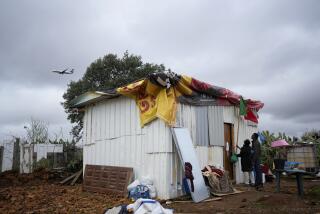Cuban Renters Get Chance to Own Homes : Government No Longer Will Play Landlord Role
- Share via
HAVANA — After renting their apartment from the government for 19 years, Omar and Elia Marin have now put about $3,000 into some long-needed home improvements.
The investment makes sense to them, for they will soon become owners of the apartment. Under a new housing law, Cubans who rent apartments and houses are to receive title to them. The law will take the government out of its role as landlord and make Cuba more of a nation of homeowners.
“It is the state’s way of getting out of maintenance obligations,” a foreign diplomat here said.
But for many Cubans, it is a dream come true. Elia Marin, whose husband, Omar, is a machinist with the merchant marine, said it is “the lifelong dream of all workers to own their own home.”
Half Privately Owned
About half of the housing in Cuba is already owned by the occupants. Most of the other half will become private property in the next few months. The process of transferring titles began last month.
“Practically every existing home, and those to be built in the future, will become the occupants’ personal property,” Granma, the official Communist Party newspaper, said. “In every case, new homeowners will be responsible for the upkeep of their property.”
According to a survey by a research center, about a third of all the residences in the Cuba are in bad repair. One goal of the new housing law is “to encourage the maintenance, improvement and expansion of dwellings by their owners,” Granma said.
The Marins have added a second bathroom, remodeled the kitchen and tiled the concrete floors in their four-bedroom basement apartment in the Vedado section of Havana. The government’s Popular Savings Bank gave them a low-interest loan for half of the $3,000 the project cost.
The bank will also lend the Marins the money to pay the government for the apartment. The price will be calculated under a formula based on the age of the building, the time the Marins have lived there and the amount of their monthly rent payments.
Under the law, no family will be required to make monthly payments in excess of what it has been paying in rent and, under another law, no rent payment may exceed 10% of the family income. Also, no buyer will pay less for his home than the equivalent of five years’ rent or more than the equivalent of 20 years’ rent.
The Marins now pay $26 a month in rent. Because past rent will be deducted from the purchase price, the apartment will be paid off in five to seven years.
Low Housing Cost
Omar Marin, 42, earns about $300 a month. His wife, 49, said this is adequate to support their family of eight, mainly because of the low cost of housing. Further, some staple foods, such as rice and beans, are provided by the government at subsidized prices.
Medical care and schooling are free in Cuba and four of the six Marin children have gone to university; the other two are still in grade school. “You don’t have to pay for books or anything here,” Elia Marin said.
Half of the cost of the family’s home improvement project was met by savings that she had made from her husband’s paychecks, she said, adding: “Right now, I’m broke.”
If the Marins had space in their apartment, they could rent out a room or two, as provided by the new housing law. It says rental fees for rooms may be set by mutual agreement between the homeowner and the renter.
That provision is aimed at reducing the housing shortage by making better use of space. And it is probably intended to legalize the already common practice of renting out rooms.
The rental of entire apartments or houses by their owners will continue to be illegal.
More to Read
Sign up for Essential California
The most important California stories and recommendations in your inbox every morning.
You may occasionally receive promotional content from the Los Angeles Times.









